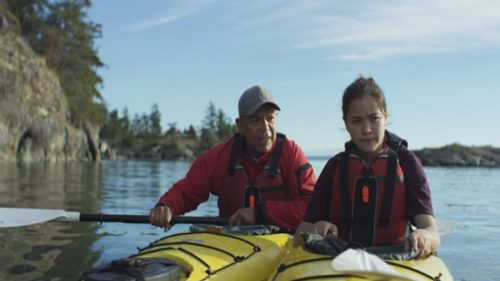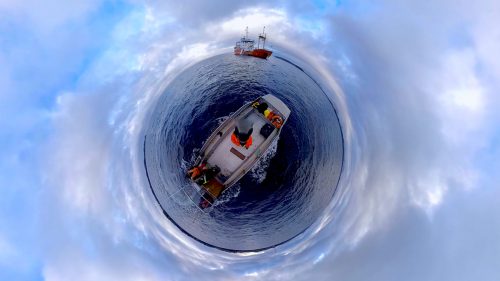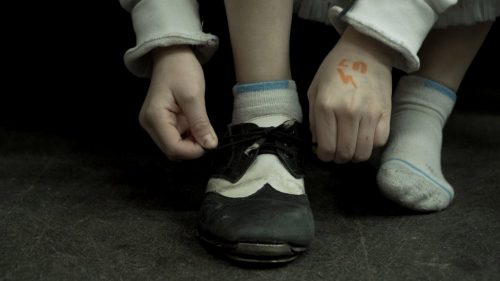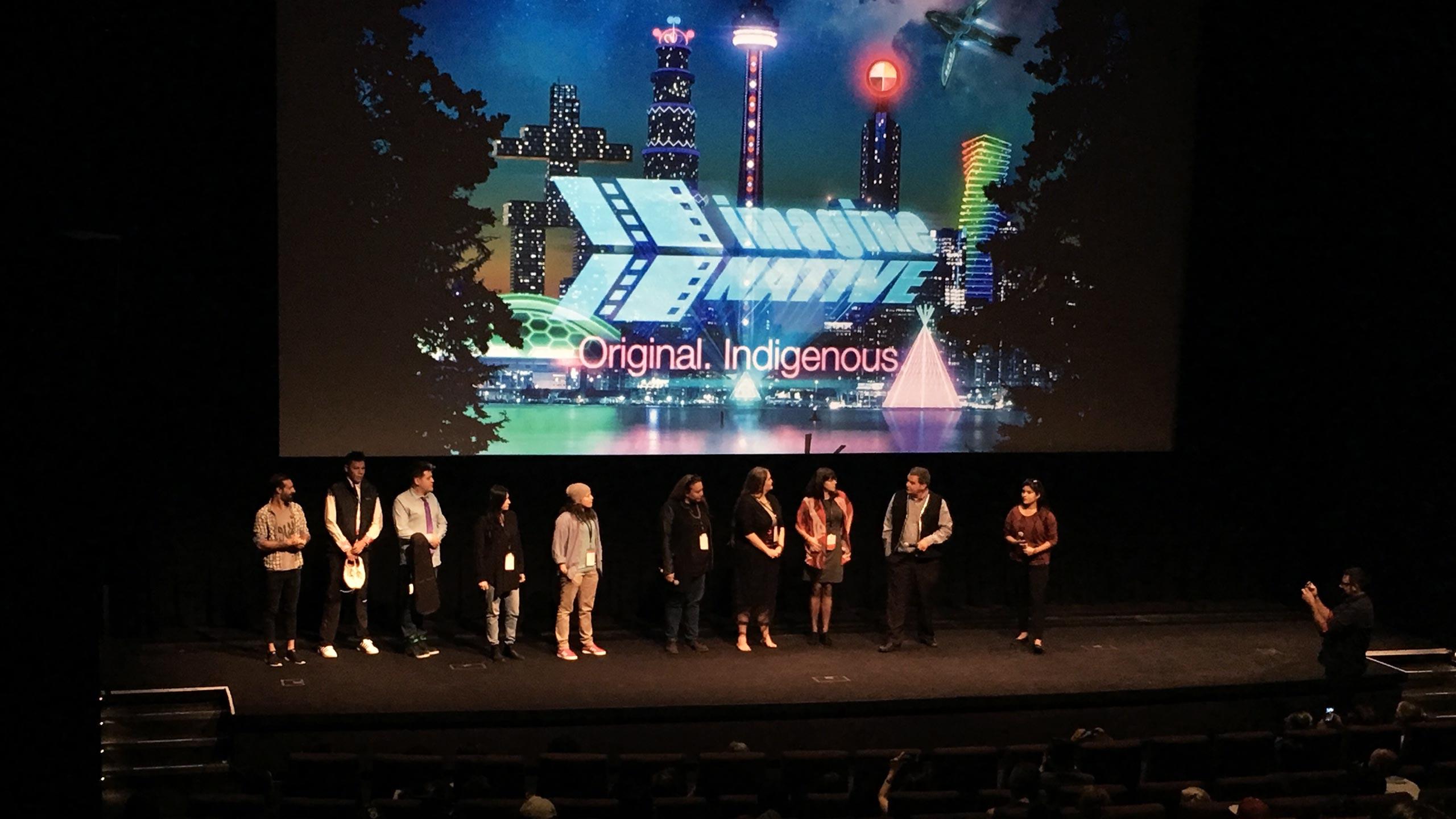By Erica Hemingway, Shauna Cox
Last weekend marked the eighteenth annual imagineNATIVE film festival, an event dedicated to featuring work by Indigenous artists. This year, five Ryerson students and graduates took part in the festival and The Eyeopener got a chance to interview a few of the artists.
Kayak to Klemtu
Ryerson film graduate Zoe Hopkins drew attention to coastal communities and the environmental challenges they face in her film featured at the imagineNATIVE Film and Media Festival.
Kayak to Klemtu is a 90-minute film written and directed by Hopkins for the imagineNATIVE festival. It narrates a story about Ella, a girl who embarks on a kayak journey to Klemtu, B.C. to stand in her dead uncle’s place at a community gathering against a pipeline that would affect their home waters.
“I want people to know that there’s a place in the world called Klemtu, and I want them to know how vulnerable communities like it are to oil tank traffic,” said Hopkins.
She said that issues like this are ongoing environmental concerns, to which her own home in Bella Bella—which isn’t far from Klemtu—is still suffering from an oil spill that occurred just over a year ago. In fact, the spill happened the day after they wrapped up the photography for the film.
She wanted to draw awareness to the dangers the federal government allows for in these coastal communities, such as allowing American vessels that carry petroleum products (a hydrocarbon that can be extracted to produce oil and gasoline) from one American port to another—to which they use Canadian waters as a highway to do so.
Hopkins wanted to centre the story largely around where she had come from, drawing inspiration from her family and her experiences in her community. The “heart” of this film came from her experience documenting a hearing in Bella Bella, where community members were asked to prove that oil tank traffic was dangerous.
This transferred into illustrating Ella’s struggle for words at the testimony in the film.
“Bella Bella is part of who I am,” said Hopkins. “Just like it is for anybody—where you come from is who you are.”
The idea for Klemtu being the location for the film was inspired by the “spirit bear,” the white-black bear that inhabits the Great Bear Rainforest near Klemtu (they last place in the world that it can be found.)
Kayak To Klemtu won The Air Canada Audience Choice Award.

Still from the movie, Kayak to Klemtu (Courtesy imagineNATIVE)
Impossible to Contain
Hopkins also shows how one tug boat was able to threaten the lives of a First Nations community in just a few minutes in her second film featured at the festival.
Her short film Impossible to Contain takes viewers deep inside Bella Bella, a Heiltsuk fishing village off the coast of British Columbia.
Living off the coast, water is the main food source for over 1400 people. These lives were soon altered when an American tug boat spilt over 100,000 litres of diesel fuel into the water in the fall of 2016.
“They call this an incident. For us this is a tragedy that people have warned about for a long time,” Hopkins said in the first line of the film.
The documentary was filmed through the lens of a 360 camera, allowing viewers to see every detail of the now diesel poisoned environment. Watching through a VR lens, they could look down at their feet and see the diesel in the water below them.
This issue was important for Hopkins to bring to the forefront, showing how very real the situation is.
“I’d like people to have to see how devastating this ‘small’ spill was and understand that a spill of any magnitude is simply impossible to contain,” she said.
Directed by Hopkins, she brings the viewers one step closer into her personal life by filming the everyday life of family in the aftermath.
“My family was really open to helping make this film happen in any way they could because they are so directly impacted and they want the world to see that,” she said.
After sitting on a boat in the cold and rain for eight hours with her cousin, the power of 360 video was clear. She knew this story had to be told as they watched their water, where they harvest most of their traditional food, with a view of a tug boat still sitting in their clam beds.

Still from Impossible to Contain, a film shot with a 360° camera (Courtesy imagineNATIVE)
Twilight Dancers
Ryerson filmmaker Theola Ross advocated for mandatory Indigenous courses and the removal of Ryerson’s name at the screening of Twilight Dancers.
Ross, and fourth-year social work student at Ryerson, is the co-director, writer and producer of the short documentary on youth in Pimicikamak Cree Nation who use square dancing to come together and overcome the trauma of rising suicides in their community.
“The suicide epidemic hit me hard,” said Ross. “Youth initiatives in my community is where my heart is.”
Her 16-minute film followed the epidemic of six youth suicides in 2016, to which 140 people were threatening to commit suicide, and 100 kids were on suicide watch.
In response, a group of young people enter competitive square dancing, to which both the dancers, choreographers and musicians involved are all impacted differently by the recent heartbreaking epidemic, as well as prominent bullying issues in the community.
The film ends powerfully, leaving the audience with a message that illustrates the quiet strength dwindling in the community—that “every member of the community is a survivor” and “We stand strong. Every individual is a tough warrior.”
Ross grew up in Pimicikamak with her mother, who was Cree. She is first generation of the post-residential school period, to which her grandmother attended.
“The youth in the film are all connected,” said Ross. “When there’s death in the community, everyone meets up with the plane that brings the body in. Then the mourning begins, and there is a four-day wake. We sing songs, we dance.”
Ross said that the epidemic was linked to the lack of resources for Indigenous people in their community, such as not having a morgue, and instead having to fly the body to Winnipeg for them to come together and mourn properly.
“I want to encourage a lot more Indigenous initiative at Ryerson,” said Ross. “Identity is very important to me, I don’t want others to be intimidated by Western society. Be who you are and never give up.”
“Twilight Dancers” was featured on CBC Shot Docs’ website on Tuesday.

Still from Twilight Dancers (Courtesy imagineNATIVE)
Other Ryerson films featured:
Kéwku
While showing the audience how to pick sage for medicine, Shuswap elder Ralph Phillips tells his life story through this short documentary, beginning with his struggles and traumatic experience at a residential school.
Kchi-Nendizan
Lena Recollet premiered her poem spoken entirely in her native tongue Anishinaabemowin on the Kchi-Nendizan, meaning the “big pride” and the feeling that comes from the rhythm of the language.













Leave a Reply